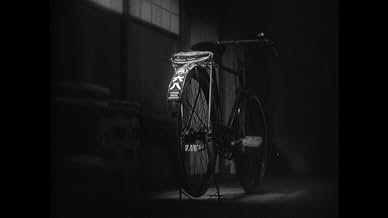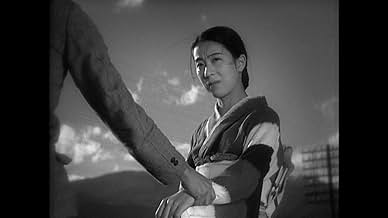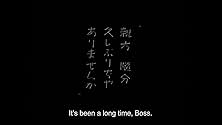IMDb रेटिंग
7.6/10
3.7 हज़ार
आपकी रेटिंग
अपनी भाषा में प्लॉट जोड़ेंA kabuki actor's mistress hatches a jealous plot to bring down her lover's son.A kabuki actor's mistress hatches a jealous plot to bring down her lover's son.A kabuki actor's mistress hatches a jealous plot to bring down her lover's son.
- पुरस्कार
- कुल 1 जीत
Kôji Mitsui
- Shinkichi
- (as Hideo Mitsui)
Emiko Yagumo
- Otaka
- (as Rieko Yagumo)
Chishû Ryû
- Shouting audience member
- (बिना क्रेडिट के)
फ़ीचर्ड समीक्षाएं
This early career (1934) Yasujuro Ozu silent film is a personal favorite. A seminal work for Ozu, "A Story of Floating Weeds" is a remarkably modernist, concise film, and the story is powerfully moving. This picture is often argued as Ozu's first fully-realized, and it is an easy film to appreciate, with Ozu's quiet artistry on showcase throughout. (The patent imagery is here: laundry on lines, silent stairwells, passenger trains, hanging lights, etc.; as well as the simplistic, low-angle shooting style, resulting in a film that feels much more familiar to Ozu fans than its age would indicate. Established Ozu fans should notice some outliers, though, including realistic domestic violence and several moving dolly shots). The storyline involves a downtrodden traveling theater group, whose manager is reuninted with his estranged "nephew," (who is, in actuality, his son) and the young man's mother. What follows is a quiet, somber story of familial bonds, unrealizeable love, and the often impossible nature of personal happiness. It is also very much a film about the lower classes, whose plight is subject for this, Ozu's first metaphorical title. The "Floating Weeds" refers to duckweed, a floating plant often referenced in Japanese poetry, and it is emblematic of aimlessness, and the drifting lack of meaning in life. "A Story of Floating Weeds" is a movie about the flatsom and jetsom of Japanese society, whose destination is open to chance and whim. Perhaps equally importantly, "Floating Weeds" is a story about fathers and sons. It is timeless, fundamental stuff, and I'd argue some of Ozu's best.
(1934) A Story Of Floating Weeds
SILENT DRAMA
Co-written and Directed by Yasujirô Ozu centering on a small traveling theater group going from village to village similar to what a circus does. The leader of this troupe is Kihachi (Takeshi Sakamoto) who happens to be stopping by at a village who once had an affair with an old flame who happens to also have a well groomed teenage son with goals to go to college and Kihachi who from the time he was young has always pose as his uncle and not as his biological dad since he travels a lot and is always absent. While hanging around, and as a result of spending a great deal of time with him as opposed to spending time with his current mistress he's been traveling with, this mistress becomes jealous and tries to sabotage this relationship by asking one of the young teenage girls in the troupe to make a play for him. It really takes about 45 minutes to get involved with the story since that is how long it takes for the viewers to fully understand it's characters and it's situations. Some of the more memorable moments are the little boy traveling with the theater troupe who at times doesn't look like he was acting but was improvising which he's character was almost absent in the 1959 colored talking version!
Co-written and Directed by Yasujirô Ozu centering on a small traveling theater group going from village to village similar to what a circus does. The leader of this troupe is Kihachi (Takeshi Sakamoto) who happens to be stopping by at a village who once had an affair with an old flame who happens to also have a well groomed teenage son with goals to go to college and Kihachi who from the time he was young has always pose as his uncle and not as his biological dad since he travels a lot and is always absent. While hanging around, and as a result of spending a great deal of time with him as opposed to spending time with his current mistress he's been traveling with, this mistress becomes jealous and tries to sabotage this relationship by asking one of the young teenage girls in the troupe to make a play for him. It really takes about 45 minutes to get involved with the story since that is how long it takes for the viewers to fully understand it's characters and it's situations. Some of the more memorable moments are the little boy traveling with the theater troupe who at times doesn't look like he was acting but was improvising which he's character was almost absent in the 1959 colored talking version!
Early silent film from acclaimed Japanese director Yasujiro Ozu, "A Story of Floating Weeds" is an ostensibly simple tale of the head of an itinerant troupe of Kabuki players reconnecting with his teenage son Shinkichi (Koji Mitsui). The boy, who had been told that his father was a civil servant who had died, is a student 'with prospects' and the father does not want him to know of his humble origins. As he says to one of the female players in his troupe "My son belongs to a better world than yours", which of course, is the same world as his. Although the focus of the story is on the 'master' and his secret family, there are a number of entertaining scenes featuring the troupe as they are stuck in the town with their performances rained out, broke and bored, which much of the gentle humour coming at the expense of Tomi-boh (Tomio Aoki), the little boy with the errant bladder who plays a dog in the troupe's show. I watched an English-subtitled Criterion Edition on TCM and my only criticism is that the piano score seemed (IMO) too 'Western' for the setting (but I have no idea what the original music was like). The film is a slow-moving but poignant and beautifully filmed taste of pre-WW2 Japanese life. Later audiences would have found Shinkichi's mother's statement that he'll soon be old enough for the draft much more foreboding than Ozu could have intended. Remade by the same director as "Floating Weeds" in 1959.
"A Story of Floating Weeds" (1934) was the second Yasujiro Ozu's film I've seen. Like with "Tokyo Story", I kept asking myself, why the film that was made so many years ago about the people who lived so far away in the world I don't know much about is so wonderfully engaging? Why was I so drawn to the characters of this human drama? The story is simple: an aging, traveling actor who is the manager of a kabuki troupe returns to a remote village where he secretly meets his former lover and her 19 year old illegitimate son, to whom he is known as "uncle." The older man finds happiness in communicating with his son who turned to be a fine young man. His current mistress, filled with jealousy because of his attachment to his secret family, hires a young beautiful girl, the member of a troupe to seduce a boy.
Directed by the great director and humanist with elegant simplicity, genuine interest to his characters and restraint, this moving film is never melodramatic or manipulative.
I liked the music score written specially for the film in 2004. I tried to watch it silent but it would take me more than one viewing to get used to no music score at all.
Seems that Ozu valued the film and thought about it a lot - he himself made a remake in color and sound 25 years later.
Directed by the great director and humanist with elegant simplicity, genuine interest to his characters and restraint, this moving film is never melodramatic or manipulative.
I liked the music score written specially for the film in 2004. I tried to watch it silent but it would take me more than one viewing to get used to no music score at all.
Seems that Ozu valued the film and thought about it a lot - he himself made a remake in color and sound 25 years later.
Warning: Some plot points are revealed in this review
One of the last silent films by Japanese master Yasujiro Ozu (later remade by Ozu himself in in color in 1959) is about a traveling kabuki troupe arriving to a small town in Japan. The troupe's leader, Kihachi (Takeshi Sakamoto) uses the occasion to meet his old lover and their grown son (who believes Kihachi is his uncle), but his current lover Otaka (pretty, ethereal Rieko Yagumo) does not appreciate this when she learns about it, so she convinces a fellow actress of the troupe to seduce Kihachi's son. Kihachi, obviously, doesn't react well either when he learns about this. Reportedly, Ozu based this film on an American film from 1928 called "The Barker".
There are few differences from the 1959 remake. For instance, here the kabuki troupe arrives to a mountain town in a train, instead of arriving to a coastal village by boat. Secondary characters are less shown. But mostly, both films are very similar, almost scene by scene, including the famous part where they are shouting over each other across a rainy street or the finale with Kihachi and his now reconciled lover drinking sake in the night train. The actor playing Kihachi, though, is about two decades younger than Ganjiro Nakamuro in the 1959 version.
Overall, this movie is not, in my opinion, as accomplished as the remake, but is still very well worth seeing, and one of the highlights of Ozu's silent films.
One of the last silent films by Japanese master Yasujiro Ozu (later remade by Ozu himself in in color in 1959) is about a traveling kabuki troupe arriving to a small town in Japan. The troupe's leader, Kihachi (Takeshi Sakamoto) uses the occasion to meet his old lover and their grown son (who believes Kihachi is his uncle), but his current lover Otaka (pretty, ethereal Rieko Yagumo) does not appreciate this when she learns about it, so she convinces a fellow actress of the troupe to seduce Kihachi's son. Kihachi, obviously, doesn't react well either when he learns about this. Reportedly, Ozu based this film on an American film from 1928 called "The Barker".
There are few differences from the 1959 remake. For instance, here the kabuki troupe arrives to a mountain town in a train, instead of arriving to a coastal village by boat. Secondary characters are less shown. But mostly, both films are very similar, almost scene by scene, including the famous part where they are shouting over each other across a rainy street or the finale with Kihachi and his now reconciled lover drinking sake in the night train. The actor playing Kihachi, though, is about two decades younger than Ganjiro Nakamuro in the 1959 version.
Overall, this movie is not, in my opinion, as accomplished as the remake, but is still very well worth seeing, and one of the highlights of Ozu's silent films.
क्या आपको पता है
- ट्रिवियाA Moxa treatment refers to the burning of an herb called moxa (aka mugwort) on, or directly above, the skin. Recipients of the treatment generally didn't like the burning sensation on their skin, although this was supposed to enhance circulation and lymphatic flow. Also, the scent of moxa is believed to have a soothing, relaxing effect, which would have been important to counteract the skin irritation.
- भाव
Kihachi: What did you plan to do with my son?
Otaka: Who cares about your son? He's cheap, like you, playing around with actresses.
[Kihachi beats Otaka]
Otaka: Are you sorry? I hope you'll be very sorry. The world is like a lottery. You take your ups and your downs. Let's make up please. That makes us even, you see. Just think how I feel.
- क्रेज़ी क्रेडिटThe film title and credits are placed before a backdrop of plain sackcloth. This would become a trademark of Yasujirô Ozu films.
- कनेक्शनFeatured in Konbini: Pablo Larraín va faire un remake de Scarface? | Video Club (2025)
टॉप पसंद
रेटिंग देने के लिए साइन-इन करें और वैयक्तिकृत सुझावों के लिए वॉचलिस्ट करें
- How long is A Story of Floating Weeds?Alexa द्वारा संचालित
विवरण
- रिलीज़ की तारीख़
- कंट्री ऑफ़ ओरिजिन
- भाषाएं
- इस रूप में भी जाना जाता है
- A Story of Floating Weeds
- उत्पादन कंपनी
- IMDbPro पर और कंपनी क्रेडिट देखें
- चलने की अवधि
- 1 घं 26 मि(86 min)
- रंग
- ध्वनि मिश्रण
- पक्ष अनुपात
- 1.37 : 1
इस पेज में योगदान दें
किसी बदलाव का सुझाव दें या अनुपलब्ध कॉन्टेंट जोड़ें
























